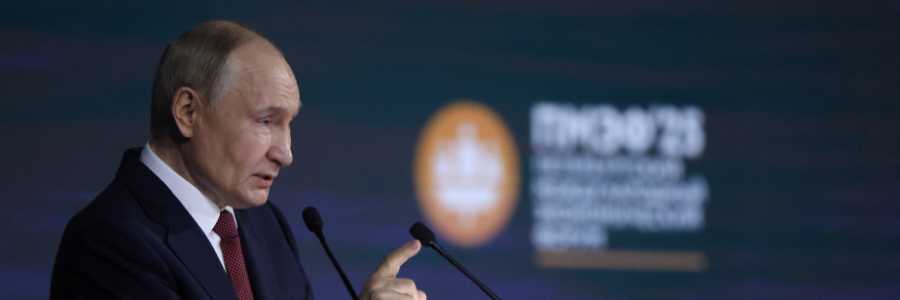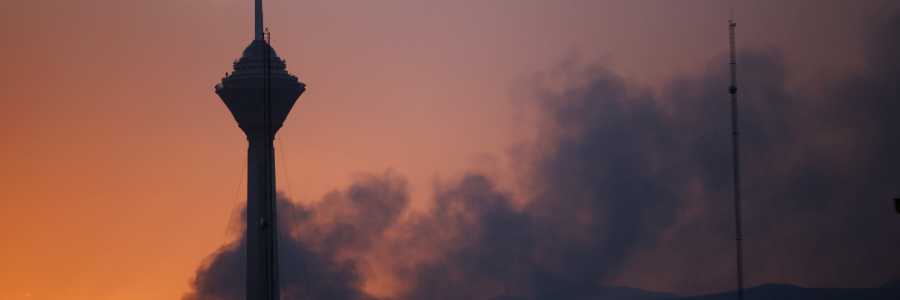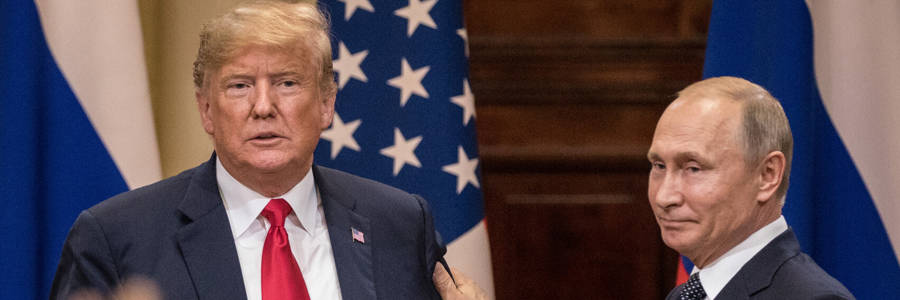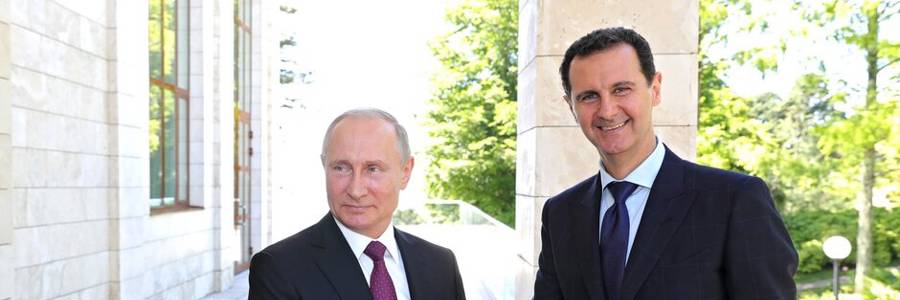Moscow ponders reconfigured Middle East, finding few openings
Posted Wednesday, 2 Jul 2025 by Pavel K. Baev

The cessation of hostilities in the Gulf on 25 June was as surprising for Moscow as was Israel’s strike on Iran on 13 June. Russia’s attempts to assess the consequences of the surge of the air war have to take into account apparent analytical miscalculations. The most serious errors of judgment pertained to U.S. President Donald Trump’s decision to join the Israeli air campaign and the follow-up decision to stop it.
Russian experts and officials tended to believe that the U.S. administration had been committed to talks with Iran in the weeks preceding Israel’s shocking first strike, and then tended to emphasize his reluctance to join the war, and presently they prefer to exaggerate the fragility of the ceasefire (Parlamentskaya gazeta; Nezavisimaya gazeta, 24 June). This stream of commentary cannot quite hide or deny the crumbling of Russia’s positions in the wider Middle East and the lack of feasible options for regaining influence.
One key proposition in Russian assessments of the new geopolitical configuration in the Middle East is the unshakable stability of the Islamic regime in Iran, which Russian analysts apparently presume to be able to withstand all Israeli and U.S. designs for 'regime change' underpinned by the extermination of a score of top commanders of the Revolutionary Guard Corps (RIA Novosti; RBC, 28 June). Only a few Russian experts-in-exile – duly labelled as 'foreign agents' – argue that the grip on power by the 86-year-old Ayatollah Ali Khamenei has weakened and the depth of discontent in Iran has deepened (Vot-Tak.tv, 24 June; The Moscow Times, 27 June).
Iranian President Masoud Pezeshkian was invited to address the summit of the Russia-led Eurasian Economic Union in Minsk and received a new round of reassurances of full support (Kommersant, 27 June). The loud condemnations of 'aggression' against Iran cannot camouflage Russia’s inability to deliver any meaningful aid to the state, with which it signed a treaty on comprehensive strategic partnership this past January (see EDM, March 13; Carnegie Politika, 19 June).
The loud condemnations of 'aggression' against Iran cannot camouflage Russia’s inability to deliver any meaningful aid to the state
For Iran, which has supplied Russia with hundreds of Shahed-136 drones – now mass-produced at the Yelabuga plant in Tatarstan – these hollow words may amount to betrayal (see EDM, 6 March 2023, 22 February, 4 March, 11 April, September 18, 2024, 4 June). Consequently, Iran is planning to rearm its decimated air force with Chinese J-10C fighters rather than Russian Su-35s (News.ru, 27 June). For many other regional players, Moscow’s failure to stand by its key ally reinforces the impressions gained from the collapse of the Bashar al-Assad regime in Syria, which was once Russia’s stronghold for projecting military power across the Eastern Mediterranean and toward Africa (see EDM, 6 February; Nezavisimaya gazeta, 23 June). Even the most jingoistic pundits in Moscow concede that the Tartus naval base and the Khmeimim air base are lost due to the intrinsic hostility of the new Syrian rulers, thereby undercutting Russia’s reach into key conflict areas of the Global South (TopWar.ru, 27 June). Iran’s membership in such international organizations as BRICS (a loose political-economies grouping initially consisting of Brazil, Russia, India, the People’s Republic of China, and South Africa) and the Shanghai Cooperation Organization, portrayed in Moscow as major pillars of a new international order, has also proven to be useless for preventing humiliation by the Israeli attack (Global Affairs, 19 June).
Iran is planning to rearm its decimated air force with Chinese J-10C fighters rather than Russian Su-35s
The most difficult part for Moscow to internalize in the changed political configurations in the Middle East is the pivotal role of the United States, underpinned by Israel’s reaffirmed military dominance over all hostile actors (Izvestiya, 23 June). Russian mainstream commentators portrayed Trump as a profit-seeking deal-maker, and not a very successful one, for that matter. His limited but perfectly timed application of air power, however, disproved such views decisively (Rossiiskaya gazeta, 23 June). Only die-hard “patriotic” bloggers attempt to describe the two-week war as a “theater” with proper warnings about over-dramatized military moves, but insightful experts point out the U.S. ability to control high-risk escalation and reassure nervous markets (Forbes.ru, 23 June; TopWar.ru, 27 June).
The most difficult part for Moscow to internalize in the changed political configurations in the Middle East is the pivotal role of the United States
Trump’s skill in combining support for Israel’s aggressive strategy with the embrace of oil-rich Arab monarchies can still hit the rocks of Iran’s intransigence, which Russian commentators tend to overestimate (RIAC, 25 June). The credible threat of new strikes and the serious incentive of relaxing sanctions still grant the United States unique leverage in controlling the Iranian problem, leaving Moscow to observe this exercise in conflict management with little capacity to influence its course (Novaya gazeta Europe, 23 June).
The bonus that Russia always expects from a spike in hostilities in the Middle East is a sharp rise in oil prices, which would currently be an answer to the deepening concerns in the government about the substantial deficit in the state budget (The Moscow Times, 25 June). In reality, after a short and slight increase, the benchmark Brent price has returned to the early June plateau, which is too low for Russia (RBC, 26 June). Key importers of Gulf oil adhered to the assumption that Iran would not attempt to interfere with tanker traffic through the Strait of Hormuz (The Bell, 23 June). The primary driver of the downward price dynamics is Saudi Arabia’s preference to increase production quotas for all members of the Organization of the Petroleum Exporting Countries Plus (OPEC+) cartel, a move that Tehran supported and Moscow attempted to oppose and ultimately failed. Russian oil companies have some capacity for increasing production, but their export niches on the global market are becoming increasingly shallow (Carnegie Politika, 18 June).
The bonus that Russia always expects from a spike in hostilities in the Middle East is a sharp rise in oil prices [...]. In reality, after a short and slight increase, the benchmark Brent price has returned to the early June plateau
Russia can hardly find any opportunity for regaining even a bit of influence amid the uncertainty of Washington’s intention to resume talks with Iran from the newly asserted position of strength. Putin’s persistent offer of mediation services is irrelevant for Tehran, irritated by Russian duplicity, senseless for Trump, who would trust his own envoys, and unacceptable for Israel, which is likely irked by Russia’s loud declarations of solidarity with Iran. Over the past decade, Russia’s diplomatic maneuvering in the Middle East has been underpinned by its readiness to project military power, as exemplified by the Syrian intervention, and its willingness to follow Saudi Arabia’s lead in the OPEC+ format (see EDM, 2 April 2018). Presently, it has become increasingly apparent to regional powers and external stakeholders that Moscow lacks the military capacity to project power and has no intention of adhering to the rules in the oil market. Putin is eager to express respect and even admiration for Trump, but this flattery cannot compensate for the damage done by his cruel execution of the unwinnable war.
- Pavel K Baev is a Research Professor at PRIO
- This text is also published by Eurasia Daily Monitor










